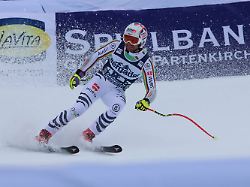“Nothing to sugarcoat”
Ski stars want to help disgraced German team
January 28, 2024, 9:14 p.m
Germany’s speed team suffered the next embarrassment this winter, this time even on their home mountain. Alpine boss Wolfgang Maier has very clear words for his crew. Two veterans who have just said goodbye offer to help.
Josef Ferstl showed off a little trick on the slopes and with a bow at the finish, he finally said goodbye to his skiing retirement in front of the home fans. There was a lot of applause from the spectators in Garmisch-Partenkirchen for this out-of-competition performance – but the fans then experienced the next severe embarrassment of the German fast racers in this World Cup winter.
No local hero made it into the top 30 when Swiss Marco Odermatt won: it was the worst home speed race for the German men in almost 17 years. At the beginning of 2020, Thomas Dreßen celebrated as the winner not far from the Zugspitze – but the Upper Bavarian, like his teammate Ferstl, has now ended his career. The two Super-Gs at the weekend showed how big the gap they leave is.
“What we delivered was simply weak, there’s nothing to sugarcoat,” summed up the dissatisfied German sports director and Alpine boss Wolfgang Maier. “We don’t have the drive at the moment to be among the absolute world leaders in speed. We admit that. But that doesn’t mean that we don’t have any prospects.”
Dreßen and Ferstl make offers
And that’s where Dreßen and Ferstl come into play. Both veterans and Kitzbühel winners announced that they would not turn their backs on the German team but would continue to help in the future. Dreßen, the best German downhill skier in World Cup history, already had a conversation with team officials on Saturday about the future, as Maier described. The 30-year-old would like to pass on his experiences in some way, explained Dreßen, who was officially farewelled before the first Garmisch Super-G on Saturday. But he didn’t want to become a “coach in the classic sense,” he added.
Ferstl went further and made no restrictions. “My heart still burns for skiing, that’s my passion. If I can support the DSV, I’ll do it in any position,” said the 35-year-old. He emphasized that he would “not be a shame” to become active as a consultant or trainer in the youth sector. Association boss Maier rated the offers as “in principle extremely positive” and made it clear: “We want the people to stay with us.” An exceptional talent like Dreßen, who only had to end his career due to injury, “no one wants to lose him.”
“It always goes wrong”
But what is important is what exactly the Alpine pensioners will be able to do in the future. Maier, for example, does not need external consultants for the coaches, as he emphasized. “It always goes wrong. We need people who are on the ground, who are on the slopes, who talk to young people. People who help us at the grassroots level.” To motivate young athletes, for example, “you can always use Thomas and Pepi,” said Maier. “We will definitely find solutions.” Basically, he advises his protégés to get used to their new life after years as competitive athletes. “It’s really good for both of them to gain a little distance.”
Ferstl was picked up at the finish line by his wife and two children on Sunday. Before the start of the race he had ridden the course and even performed a spectacular straddle during a jump. “It was extremely fun, I had no pressure anymore, I felt the skis, the slopes. It was a very cool feeling,” he described. The other German racing drivers were once again far away from such a feeling. Romed Baumann (35th) and Andreas Sander (39th) missed the points, each well over two seconds behind Odermatt. Simon Jocher – who was 18th on Saturday in France’s Nils Allegre’s surprise victory – was eliminated.
